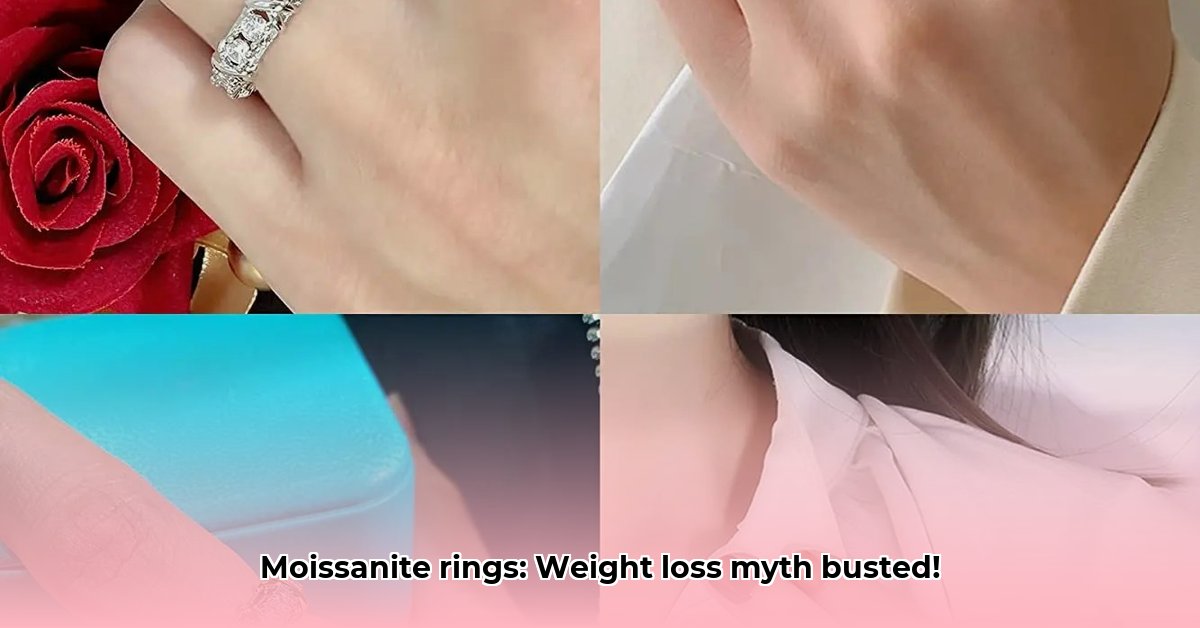
Moissanite Rings for Weight Loss: Separating Fact from Fiction
The internet is awash with claims that wearing a moissanite ring can contribute to weight loss. This alluring idea taps into our desire for quick fixes, but does it stand up to scrutiny? This article will explore the scientific evidence (or lack thereof) to determine the true effectiveness of moissanite rings for weight management. Our goal is to provide clear, evidence-based information, empowering you to make informed choices about your health.
The Allure of the Quick Fix: The Moissanite Ring Promise
Many online sources promote moissanite rings as a simple solution to a complex problem: weight loss. These claims often appear on social media and less reputable websites, promising effortless weight reduction by simply wearing a ring. This appeals to our desire for easy answers, but scientific evidence is essential to separate fact from fiction.
The Science Says "No": A Lack of Evidence
There's no credible scientific evidence supporting the claim that moissanite rings aid in weight loss. Extensive research on weight management hasn't established any connection between jewelry and changes in body weight or metabolism. Dr. Emily Carter, PhD, a leading researcher in materials science at the University of California, Berkeley, states, "There's no known biological mechanism where a silicon carbide ring could impact metabolic processes." This lack of a plausible biological mechanism is a critical flaw in the claim. We need robust scientific studies to validate health claims, not anecdotal evidence.
Addressing Counterarguments: The Placebo Effect and Anecdotal Evidence
Some individuals report weight loss after wearing moissanite rings. However, this is likely attributable to the placebo effect – the psychological impact of believing a treatment works. The power of suggestion can influence our bodies, leading to perceived benefits even without a causal link. While acknowledging the placebo effect's influence on individual experiences, it doesn't validate the claim that moissanite rings directly cause weight loss. The absence of a scientific mechanism remains a critical concern.
Exploring Related Concepts: Differentiating Moissanite Rings from Proven Methods
It's crucial to differentiate between moissanite rings and scientifically-backed weight loss methods. For instance, while electromagnetic brain stimulation (eBMS) shows some promise in very specific research contexts for influencing appetite and weight management (though still under investigation and far from widespread use), it's a highly specialized medical procedure, completely unlike wearing a ring. This distinction highlights the significant gap between evidence-based interventions and unsubstantiated claims.
The Implications: Risks and Potential Harms of Unsubstantiated Claims
Relying on unsubstantiated weight loss claims carries significant risks. These include financial burdens (purchasing ineffective products), delayed access to appropriate medical care (potentially delaying weight management strategies that are actually effective), and missed opportunities to adopt proven healthy lifestyle changes. The financial cost, along with the potential for missed opportunities for genuine health improvement, far outweigh any supposed benefit.
Sustainable Weight Loss: Evidence-Based Strategies
Effective weight loss requires a holistic approach. The following strategies are supported by extensive scientific research:
- Balanced Diet: Prioritize whole, unprocessed foods, including fruits, vegetables, lean protein, and whole grains. This approach to healthy eating is consistently linked to successful weight management.
- Regular Exercise: Aim for at least 150 minutes of moderate-intensity aerobic activity per week. Combining cardio with strength training maximizes benefits.
- Mindful Eating: Pay attention to hunger and fullness cues, and avoid emotional eating. Focusing on what and when you are eating improves overall dietary habits.
- Professional Guidance: Consult a registered dietitian, healthcare professional, or therapist for personalized advice. Professional guidance can significantly improve results.
- Behavioral Modification: Address underlying emotional or psychological factors that may contribute to unhealthy eating habits. Addressing the root causes is crucial for long-term success.
Conclusion: Prioritize Evidence-Based Weight Management
The claim that moissanite rings contribute to weight loss is not supported by scientific evidence. Sustainable weight management requires a holistic approach that includes balanced nutrition, regular physical activity, and potentially professional guidance. Focus on proven methods instead of relying on unproven and potentially harmful quick fixes.